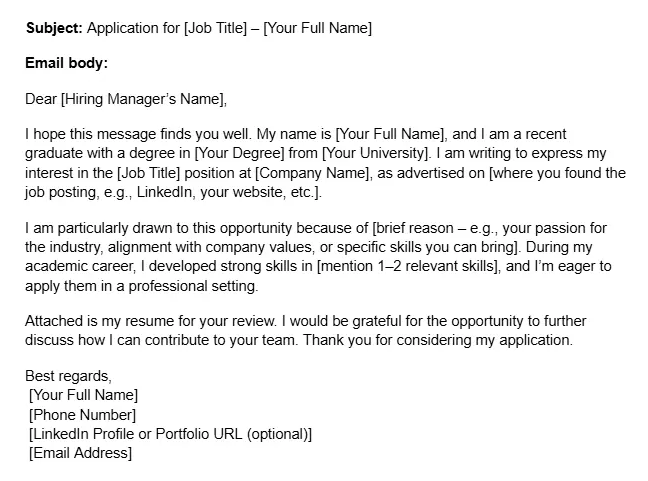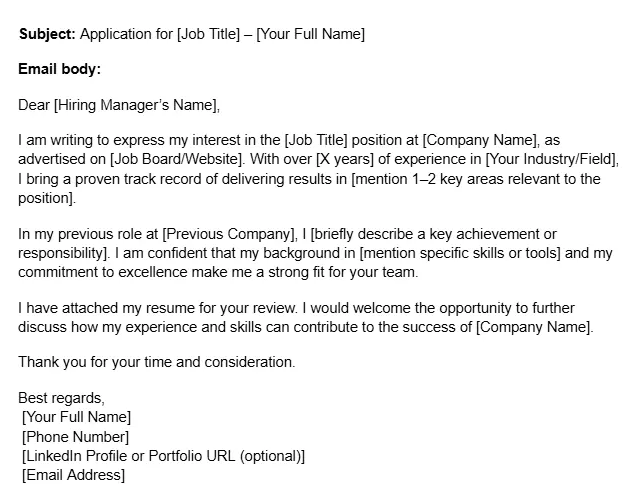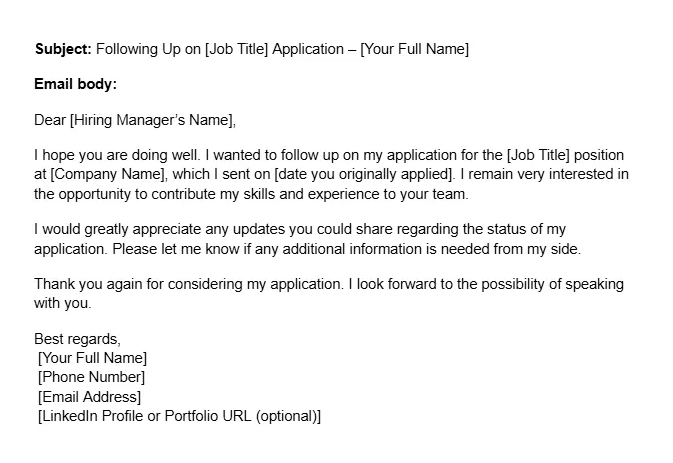What to Write in Email When Sending Resume: Professional Examples
What to write in email when sending resume in 2025?
Many candidates spend hours perfecting their resume but struggle with what to write in email when sending resume to an employer. Drawing on years of experience in recruitment and application coaching, I’ll explain how to craft a concise, professional message that sets the right tone and increases your chances of getting noticed. If you're unsure what to write in an email when sending your CV or resume, start with a brief, personalized introduction. Explain why you're reaching out, mention the job title, and state that your resume is attached. This message should be clear, concise, and respectful of the reader’s time.
What should I write in an email when sending resume?
When sending a resume by email, you should keep the message concise and professional. Briefly introduce yourself, specify the position you're applying for, and mention that your resume is attached for review.
Does the job posting ask you to submit a resume by email? Keep in mind that what you write in an email is just as important as the attached resume and cover letter. An email for a job application should briefly introduce you to the hiring manager, explain your interest in a job position, and encourage them to read your resume.
In this article, we will share the best practices on how to write a resume email that piques the interest of the recruiter. Plus, we will share resume email examples for different situations.
Struggling to write a resume that will land interviews? Our experts can help. At ResumePerk, we will match you with a resume consultant who knows your industry. Your writer will create a tailored resume that is effective for ATS and impresses human hiring managers. Newcomers discounts of up to 15% are available!
Before we dive deeper into what to write in an email when sending a resume, let's look at some good examples. Use them as inspiration for crafting your letter.
Email Templates and Samples for Sending a Resume
Need a quick reference? Below you'll find professional email samples to send resumes in different situations. These examples will help you structure a message when applying for a job via email.
Resume email sample for graduate

Download Email Template for Graduates:
https://docs.google.com/document/d/1G3iv3M32EwBaZqzBY73Tma6-gdcz6CzCMSmp5kornlg/copy
This letter format is ideal for a student or graduate. Include a target job title, relevant internships, and academic achievements to intrigue the recruiter. This letter sample also has a good structure and is skimmable, which will contribute to a good impression of you.
Email Format and Structure for Resume Submission
Before writing your message, it’s important to follow a proper format. Use a subject line that reflects the job title, and write a clear body that includes a short introduction, reason for applying, and a polite closing. Here's how to format your email to make a strong impression.
What to say in email with resume
Your email message should be polite and purposeful. Express your interest in the position and encourage the recipient to review your attached resume and cover letter.
Resume email sample for experienced professional

Download Resume Email Sample for Professionals:
https://docs.google.com/document/d/1oOgR0ylT2eTd4PaWxxc144zBP4IwlNrqcgRal-EJsm8/copy
This resume email template works great for an experienced professional or manager. It also indicates the target role and the company name and encourages the recruiter to review the attached resume. Include how many years of experience you have, add 2-3 professional achievements, and show your motivation for joining the company. Such an approach will surely get you noticed. Be sure to read job posting carefully! It can be the case when you have to send your email as a Word document.
Sample email to send resume for job
Here’s a quick sample of a simple email you can send when applying for a job. Remember to personalize it based on the specific role you're targeting.
Sample follow-up email

Download Follow-Up Email That Works:
https://docs.google.com/document/d/17_DONHtlj8hKDdFoYsR_yfM2xhKZvBOFRU0v0s-MK80/copy
In this letter, the candidate follows up after applying for a job. Following up on the status of your application will surely catch the hiring manager's attention. If you decide to send such a letter, highlight your continued interest in the position and your qualifications for the role. You needn't send your resume as the hiring manager already has it, but you may attach it just in case.
Now, let's move on to the best practices of writing a letter for sending a resume to a company.
Follow-Up Email Tips
It is not enough to write a polite follow up email with a concise subject line. Your email should still be focused on the job opening and clearly state that you are genuinely interested in accepting the job. Let's check a couple of the important points to keep in mind!
When following up after emailing a resume, be sure to maintain a professional tone and reference your initial resumes email to the company.
When to send a follow-up email
It is generally accepted in a hiring process that follow up emails are sent within 3 to 5 business days after the initial message. Never send it on the next day! You do not want to appear too pushy and should give a hiring manager enough time to consider the interview. Do not forget to add the specific subject line!
What to include in a follow-up
First, keep your email concise. Do not add any separate attachment, unless you were specifically asked to provide extra information. Typically, your potential employers expect to see the following eight points in your follow-up email. Double check that you have all of these elements and that all grammar errors are corrected. The elements that must be included are: subject line, greeting, gratidue for considering your application, the position you are applying for, reiterated interest, key points (skills or experiences), invitation for the response, and a sign-off.
Follow-up mistakes to avoid
The first common mistake is being too pushy. When you are impatient and demand a quick response, it is a bad sign. You need to give enough time to your potential employer. If you cannot wait, send a test email to your friend and forget about it for a couple of days.
The second mistake is writing a generic message. You need to be clear about what you want to get in response. Do not restate the information from the job listing, and do not transcribe the entire interview. You need to make your follow-up email personal and yet relevant to the job application.
The third mistake to keep in mind is ignoring professionalism. You should never use casual language or excessively informal tone. Your goal is to make a positive impression. Therefore, try to write a professional email and be respectful.
8 Professional tips for writing an email for a resume
Whether you are sending a resume in response to a job posting, a cold email, or a referral email, the structure and key rules will be the same. Follow these tips to craft a catchy, professional letter.
Know the right time to send your letter
When you send a letter with your resume, the time is as important as the letter's content. Hiring managers are overwhelmed with emails, so send your letter when it has the highest chance of being opened.
The perfect timing is before 8 AM on Monday or Tuesday. Thus, the recruiter or hiring manager will see your letter at the top of the list and are more likely to read it. If you send your email on Friday, the recruiter might be already overwhelmed with other tasks and your letter will never get read.
Find out the hiring manager's name
If you don't know the name of the person responsible for hiring, do your research. You can find the hiring manager's name on LinkedIn, through your contact in the company, or even by calling the organization.
Addressing the person directly has its benefits. Firstly, it shows that your letter is personalized and you are not mass-mailing. Secondly, it proves that you've done your homework and researched the company. Finally, as you research the person, you can learn more about them and find common ground that you can mention in your email.
If there is no way to find out the person's name, use Dear Hiring Manager as a salutation.
Use a professional email address
In 2024, sending a resume with an email like liquorcandy1995@gmail.com raises questions. Maybe, this email was cool fifteen years ago, but it is best not to use it for your job search anyway.
Use an email address with your first and second name in it. It looks like a tiny detail, but using a professional-looking email address surely contributes to that first impression. Plus, you don't want to get your resume tossed because of something as insignificant as a bad email address.
Craft a catchy subject line
According to many surveys, a subject line often determines whether your letter gets opened. An effective subject line should attract attention and state the purpose of your letter.
When writing a sample email for a job application, include the job title, job ID, and your full name in the subject line. Here are the examples:
Example 1: Job Application - Sales Associate, ID #10824 - Marie Mendelson
Example 2: Job Application: Senior Marketing Manager, Barbara Hensley
If the job description has any instructions about the subject line, use them precisely. If not, stick to the format above.
Use a traditional email structure
Any resume email should have an introduction, an email body, and a conclusion with a call to action. Let's have a brief look at what to write in each section.
In the opening sentence, add a specific job title, company name, and the purpose of your letter (for example, to apply for a job). You can add the name of your reference in this paragraph too.
In the email body, list your relevant skills, education, and professional achievements in 2-3 sentences. Remember that the recruiter receives dozens of resume emails, so only include facts that will pique their attention. Introducing a few key skills, boasting a prestigious degree, and a couple of achievements with numbers is a very effective strategy.
In the conclusion of your email, thank the prospective employer for their time and consideration. Mention that resume files are attached for their review and express interest in the job.
When attaching your resume, use a PDF or DOCX format. These file types are the most popular and open on any device. If the employer asks you to use a specific file type, follow their directions.
Add your contact details at the bottom
Put a professional signature at the end of the letter. Then, put your contact details in the letter. You can include your phone number and email address.
It is also helpful to add 2-3 links, for example, to your personal website and LinkedIn profile. Thus, you let the recruiter learn more about you and get interested in hiring you. Plus, this simple step sets you apart from other job-seekers who don't bother to share comprehensive information about themselves.
Proofread to avoid mistakes
Mistakes, typos, and poor grammar in job application documents turn off employers. They show sloppiness and lack of attention to detail and can jeopardize your chances for a dream job.
So, take the time to review your sample email cover letter before you send it. Use a spell-checking software or proofread the document manually. Look for typos, incorrect tenses, missed commas, and other common issues. If this job opportunity is super important to you, consider hiring an editor to review and strengthen your letter.
Attach a cover letter, too
First things first: an email you use to send a resume is not your cover letter. However, it can replace the letter in some situations.
If you are puzzled and not sure whether you need to attach a cover letter, consider the reasons why uploading a cover letter is necessary:
- The job posting specifically asks for it. If the job ad requires you to apply with a resume and a cover letter, ALWAYS include a letter. Upload it as a separate document that is formatted in the same way as your resume and focuses on the same skills and experience. Don't copy and paste your cover letter into the email body unless the employer asks for it.
- Your career has issues. If your resume has employment gaps or job-hopping, or you are changing careers, you need a letter that will explain these issues. Your letter body is not meant for that. Send a separate letter and write why you took a year off work and what you were doing during that time.
- You are applying for a senior-level position. C-level applicants can hardly explain their career history and successes in a couple of paragraphs. As a senior manager, you need a comprehensive letter that sells your personal brand, showcases successes, and lists all your critical skills. Send such an email as a separate document.
In any other case, you may use a resume email as a replacement for an actual cover letter for job applications.
Emailing a resume correctly increases your chances of making a professional impression on a hiring manager.
What to Write in the Subject Line When Sending Your Resume
The subject line is the first thing the hiring manager sees. To improve your chances, mention the position you’re applying for and your name. For example: “Graphic Designer Application – Jane Smith”.
Resume Email Subject Line Examples
It is a huge challenge for many people to write impressive and yet not excessively creative email subject lines. Let's take a look at several examples you can freely use for your follow up emails
Best subject lines for job applications
- Application for Marketing Manager – Emily Johnson
- Frontend Developer Application – James Smith
- Resume: Project Coordinator Role – Sarah Lee
- Experienced UX Designer Applying for Open Position – Michael Davis
- Job Application: Customer Support Specialist – Olivia Brown
Subject lines for graduates
- Recent Graduate – Application for Entry-Level Marketing Role
- Computer Science Graduate Seeking Junior Developer Position
- Business Graduate – Interest in Analyst Role at [Company Name]
- Application: Communications Graduate for Assistant Role
- Fresh Graduate with Internship Experience – Ready to Contribute
Subject lines when referred by someone
- Referred by John Smith – Application for Sales Associate Position
- Referral from Jane Doe – Interested in Marketing Coordinator Role
- Recommended by Mark Johnson – Applying for Software Engineer Position
- Job Application – Referral from Emily White for HR Assistant Role
- Referred by Alex Brown – Pursuing Customer Support Specialist Role
Mistakes to avoid in subject lines
Being too vague. This rule cannot be stated enough times. If your reader has no idea what you want, your email was useless and you lost your chance for employment.
Using information language or slang. Do not ever write "hey there" or similar phrases. You need to be professional in every line you put in your follow-up email.
Not including the job title. It is always better to refer to the specific job title. If the company is large, a hiring manager may have no idea who you are and simply ignore your email.
Using all caps. This rule may seem obvious and yet always check on your writing before you click on "send". It is a huge mistake to use all caps.
Misspelling names or job titles. If you have typos in the subject line, it automatically gives a bad impression on the reader. It shows that you are not attentive to detail.
Key Takeaways:
- When sending a resume to a company, write a concise, professional email. This email should show your interest in a job and highlight your qualifications and contact details.
- Send your resume in DOCX or PDF format. These formats open correctly on most devices.
- Choose the right time to send your resume and cover letter. The best time is Monday and Tuesday before 8 AM.
Increase your chances for a job position
Surveys show that job-seekers with professionally written resumes have a 32% higher chance of getting a job. If you aren't getting enough interviews, our experts will help strengthen and polish your documents. We will correct any mistakes and focus on your core skills and achievements for a positive impression. The resume consultant works directly with you until you're satisfied! Chat with us or place your order today for a brighter professional future!
Author: Editorial Team at ResumePerk.com
Reviewed by: Certified Career Expert
Last updated: November 2025
Recommended reading


